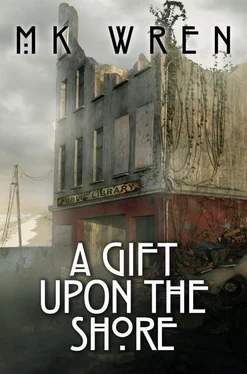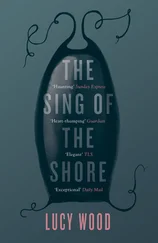After a moment he opened the front door of the car, then paused, frowning. “Ms. Morrow, I figure you’d like to know. We got a report yesterday that there’s been two cases of Lassa in Oldport.”
Mary felt a chill at the back of her neck, and Rachel went pale. “That’s only thirty miles away,” she whispered.
He nodded grimly. “Right.”
Neither Rachel nor Mary spoke as he got into his car and backed down the drive, not until Rachel said, “Mary, I think we’d better start making some plans.”
O cease! must hate and death return?
Cease! must men kill and die?
Cease! drain not to its dregs the urn
Of bitter prophecy.
—PERCY BYSSHE SHELLEY,
HELLAS (1821)

Rachel said once—stated categorically—that it is impossible for a wave to make a shape that is not perfectly graceful. Now at evening I look down at the beach and consider her dictum. In forty years I haven’t forgotten it; the sea reminds me of it each day.
On this clear spring evening, the tide has gone out with the day, the sun has just set, its final moments marked with a pinpoint burst of incandescent green. The sky above the horizon is rose orange shading into pale yellow made green by its context, shading into warm blue and ultimately into ultramarine. There is little light left for the sea; it is pewter gray. The beach is umber verging on black, a somber expanse deserted by the tide. At the sea edge of this newly revealed strand, the waves have scoured out a topography of miniature hills and valleys, every valley a pool of captured seawater, every pool a mirror set in velvet umber, reflecting in reverse order the ultramarine, warm blue, green-hinting yellow, and rose orange. The shapes of these sky mirrors are all unique, the relationships of concave, convex curves complex and elegant. They are perfectly graceful.
I sit at the end of the table in the living room, my chair turned so I can look out the window at the beach and watch the children playing tag on the grass beyond the deck. Jonathan, the oldest, is also tallest, and he runs like a deer. Yet he lets Isaac catch him sometimes, and they fall laughing into the grass. Jonathan even lets eight-year-old Mary catch him, although she’s so quick and lissome I wonder if he isn’t fairly caught.
The youngest children, Deborah and Rachel, are downstairs being put to bed. Jerry is helping Miriam with that task, while Esther, Enid, and Grace are in the kitchen cleaning up after the evening meal. I can hear their voices, the clatter of silverware and pots. Bernadette is in the workroom grinding herbs for her medicines. Behind me, the fire crackles in the fireplace, beside me Stephen sits with his chin propped in his hand, and I remember my years of solitude here and know I’m fortunate to have such warm and peaceful evenings in my old age.
On the table is a stack of Rachel’s watercolor paper cut into small rectangles. My hand still aches from wielding the old, dull scissors. I haven’t yet begun writing the Chronicle, only preparing the paper. Fine rag watercolor paper: D’Arches rough, Whatman’s hot press, Utrecht cold press. I’ve saved this paper all these years. Now I know why.
Stephen picks up a piece, runs his thumb over the rough surface. “Did you say this paper is handmade, Mary?”
“Yes, some of it.”
“Could we make paper here?”
How many times have I asked myself that question? “I think so, Stephen. I have a book on papermaking. Maybe you’d like to read it.”
“Yes, I would. Someday we’ll have to make our own paper.”
I smile at that. The words right out of my mouth. “I’ll find the book for you tomorrow.”
Not tonight. This is the sabbath. And this isn’t one of my sanctioned lessons with Stephen. Sunday is supposedly a day of rest. It’s also the day of the sabbath service: at least four hours of sermonizing and hymn singing. The children have no choice but to endure it, and I always feel sorry for them. Perhaps Jerry does, too. He usually plans something special for Sunday afternoon, and today it was a picnic on the Coho River. I didn’t go along, but I’m proud of Jerry for making Sunday afternoons pleasurable for the children. When he was a child, his Sundays offered him no pleasure.
“Mary, what did you and Rachel do after… after your friends were killed?”
This may not be a sanctioned lesson, but Stephen is still curious, and I’ve never limited my teaching to the hours designated for school.
“Well, we barricaded ourselves from the outside world, Stephen.”
“Because of the Rovers?”
“Partly, although the local Rover population had been drastically reduced. No, what really drove us into isolation was Lassa fever.”
“Isolation? What do you mean?”
“Just that we made ourselves entirely self-sufficient so we wouldn’t have to go out among other people for any reason. We were already nearly self-sufficient. We had land and water and livestock. We pooled our money to buy everything we’d need to keep going for—I don’t know. A year or so. We never committed ourselves on the length of our retreat.” And never imagined it would, in a sense, be permanent.
“What kind of things did you buy?”
“Well, nonmotorized farm implements, for one thing, like the plow we still use. Of course, training Silver to pull it wasn’t so easy. We bought seed, everything from clover to squash, canned goods by the case, flour, rice, and beans by the sack. Canning jars, kerosene, gasoline—for the chain saw, not the van. Medicines, veterinary supplies, clothing, and many more things I can’t remember now. In a way, the preparation for our siege was good for us. It gave us something to take our minds off the grief, and we needed that, especially Rachel.”
Stephen’s dark eyes are clouded. He nods and pulls in a deep breath. “How long did it take you to make all your preparations?”
“About a month and a half. By then the edge was off our grief, and even in our isolation, life returned to a kind of norm. There was more work without Connie and Jim to help, but I still did some writing, and Rachel did some painting. It was an oddly peaceful hiatus, yet we were never free of fear. We were living through the death throes of a golden age.” I look down at the blank sheets of fine rag watercolor paper, and Stephen waits patiently.
“It was reaching critical mass, Stephen, all the deadly factors coming together. We still had our window on the world. The television. We knew about the riots and revolutions and the cities surrendered to anarchy. We knew about the failure of the monsoon in India for the third year in a row, the locusts in the Mediterranean and Africa, the killer smogs in Europe and on the East Coast of this country, about the Sino-Russian War, the nuking of Jerusalem, the droughts all over the world. And, of course, there were always stories about the Lassa epidemic and starvation. It was falling apart out there, and yet Rachel and I kept hoping. Now I can’t imagine why. It was too late for hope.”
Stephen seems to be watching the children, but his frown tells me his thoughts are elsewhere. “Miriam says it was prophesied, all the… falling apart.”
I make no comment on prophesies. “We were also aware, through our window, of the crisis over that Russian fishing fleet. Some American admiral decided they were too close to our coast and sank all twenty ships. There was a furor in the circles of power, and all the charges and countercharges had nothing to do with the fishing fleet. In fact, we’d been on fairly good terms with the Russians for a long time. But most wars began with a triviality. What was really happening was a kind of mass madness—the same kind of madness that developed in animal studies when a confined population increased past a crucial point. But we were supposed to be smarter than white rats. And yet… it finally happened.” I feel my eyes ache with tears even after all these years. That grief can’t be salved by time, not for those of us who lived through that ultimate human catastrophe.
Читать дальше













